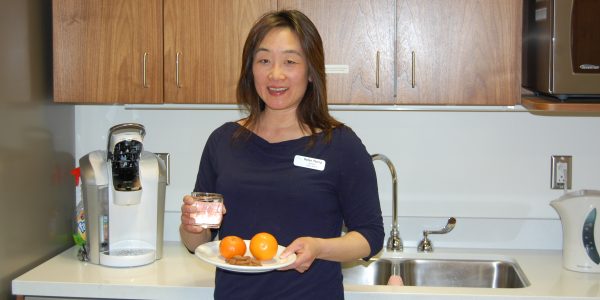Population Health: Public Health Dietitian works to promote healthy eating and improve student learning
This is the fifth and final installment in our series on the North Shore Population Health team.
If there is one conversation you won’t ever hear Helen Yeung have with kids or adults, it’s debating about what is good food or bad food. That might sound counter intuitive to most us given that Helen is the VCH Public Health Dietitian on the North Shore, who works with school teachers, counsellors, students and parents to promote healthy eating and prevent disordered eating.
“We need to neutralize our language when we talk about food.”
“We need to neutralize our language when we talk about food,” says Helen, who is a member of the N.S. Population Health and Child and Youth team and who also works with Jessie’s Legacy (eating disorders prevention and awareness). “Research shows the shame and blame approach to get people to change their eating habits doesn’t work. Instead of labelling foods good or bad, you could use language such as ‘always/everyday’ foods versus ‘sometimes’ foods.”
It’s a topic that comes up frequently, especially when Helen hosts workshops for parents or visits high schools to talk to students.
“Usually, the most common question I get from students is when they pull something out of their back pack, a granola bar for instance, hold it up and ask me if it’s healthy food,” says Helen. “I tell them rather than thinking if a food is healthy or unhealthy, what matters is how much and how often they eat that particular item and the other foods in their diet. The totality of the other foods you eat matter more than one particular food.”
Translating research into action
As a public health dietitian, Helen uses evidence-based health promotion strategies, collaborates with stakeholders and other adult influencers to promote healthy eating and improve student learning. A key part of her role is to translate current nutrition research into action.
“People generally know what to do but the challenge is overcoming barriers and giving people the message that healthy eating can be tasty and economical but it does require planning,” says Helen. “The factors that influence eating are the same for kids and adults: taste, access, time, and cost. Kids can influence parents by suggesting items to add to the family’s shopping list. For example, apples and cucumbers that students tried at school through the BC School Fruit and Vegetable Program.”
Positive changes happening
Helen also helps schools implement the Guidelines for Food and Beverage Sales in BC Schools (food service, vending machines, fundraisers, sports days), which looks to create both the demand and supply of healthier foods. She’s seeing positive changes since the guidelines were first introduced 12 years ago.
“Norms and expectations have changed so that students who are in grade 12 now will not have seen candy bars and pop for sale at their schools,” says Helen. “Change happens when there is a concerted effort by stakeholders at every level (students, parents, teachers, principals, and food suppliers) to follow the guidelines.”
Work still to be done
But there is still work to be done.
According to the 2013 McCreary Adolescent Health Survey, 34 per cent of healthy weight males on the North Shore were trying to gain weight while more than half (53%) of healthy weight teen girls were trying to lose weight.
“It’s so normalized to go on diets in our society,” says Helen, who promotes health as a value versus size as a goal. “But I try to remind teens and parents alike that healthy bodies come in different sizes and shapes and to accept what is not in their control – that over 50 per cent of how their body looks is based on genetics. Regardless of efforts to change it, over time your body will fight to maintain or resume the shape it was born to be. An important question to ask is why do you want to change your current body weight and shape.”
For Helen, food is more than nutrients and health is more than what you eat.
“Being healthy enables us to learn, work, care, play and do the things that are important to us,” she says “While I promote an inclusive and balanced diet which emphasizes more plant foods, I believe that there is room for all foods in moderation. It is important to recognize that food is social, cultural, and has many meanings and roles in addition to promoting physical health. Food nourishes, strengthens, and connects us. Both how and what we eat are important to our overall health.”
Read Helen’s VCH blog on taking healthy eating to an unhealthy extreme.
Click here for VCH nutrition resources for North Shore schools.
See related stories:
- Population Health: What is it? Find out in this five-part series
- Population Health: Congregate Meals Program provides nutrition and social connection
- Population Health: Active Living Coordinator gets people walking, running, cycling & more
- Population Health: Helping create a dementia-friendly North Shore

